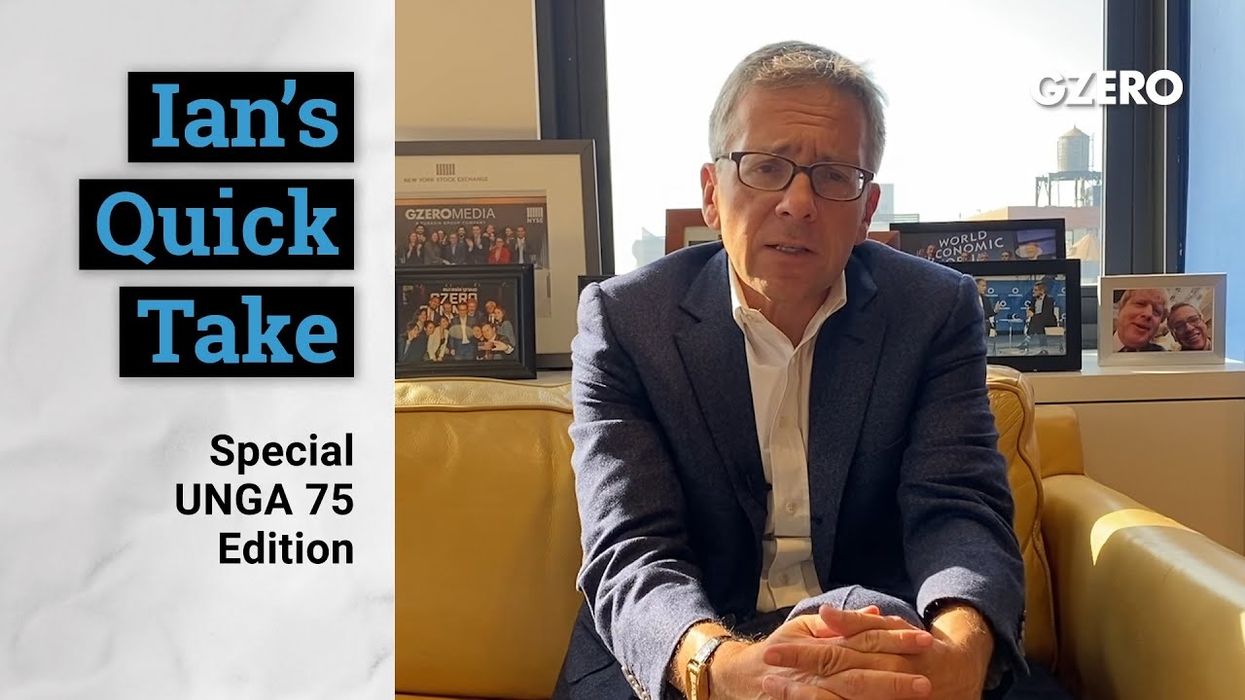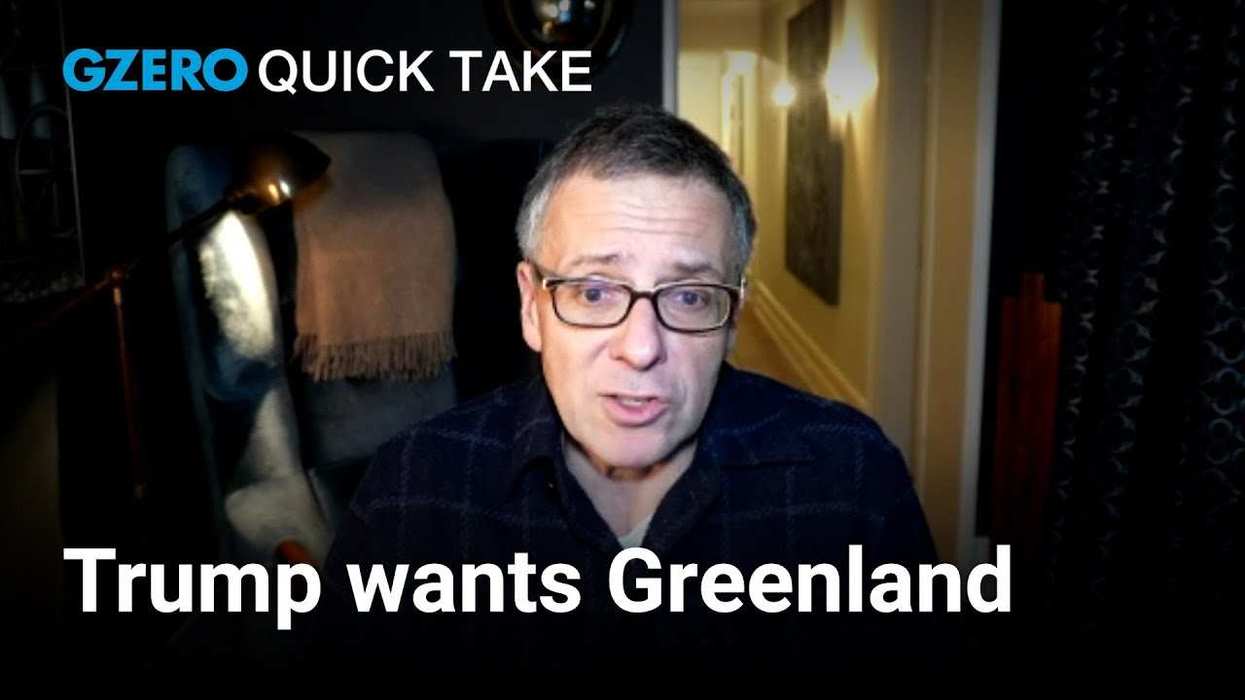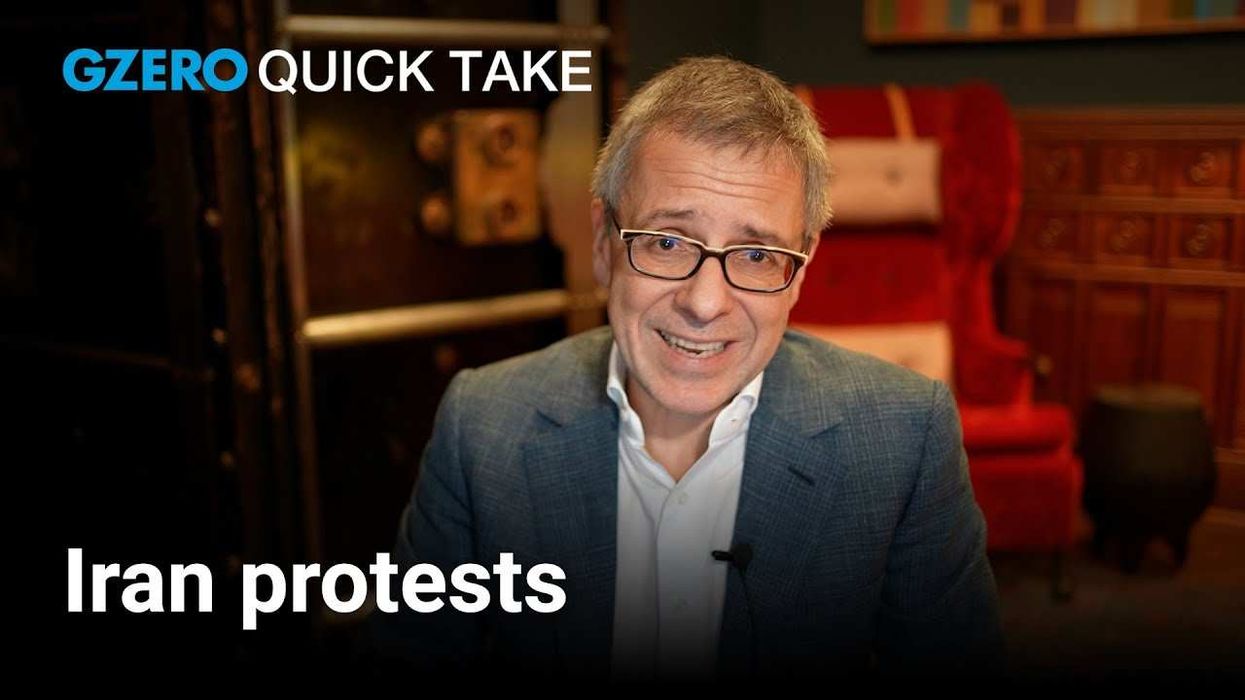VIDEOSGZERO World with Ian BremmerQuick TakePUPPET REGIMEIan ExplainsGZERO ReportsAsk IanGlobal Stage
Site Navigation
Search
Human content,
AI powered search.
Latest Stories
Sign up for GZERO Daily.
Get our latest updates and insights delivered to your inbox.
Global Stage: Live from Munich
WATCH RECORDING
Ian Bremmer's Quick Take:
It's UNGA week, very unusual New York to have the United Nations General Assembly meetings. You know, the city is locked down. It's almost always locked down this week, but usually you can't get anywhere because you've got all these marshals with dozens of heads of state and well over a hundred foreign ministers and their delegations jamming literally everything, Midtown and branching out across the city. This time around, the security cordon for the United Nations itself is barely a block, and no one is flying in. I mean, the weather is gorgeous, and you can walk pretty much anywhere, but nothing's really locked down aside from, of course, the fact that the restaurants and the bars and the theaters and everything else is not happening given the pandemic. And it's not just in the US, it's all around the world.
So we're having an UNGA without world leaders, and they are mailing it in. And I would argue that in addition to mailing in virtually their speeches, in many cases, they're mailing in leadership. I just had a conversation with the Colombian president, Iván Duque, who said the first few months, there's been a lot of leadership individually, but nothing from a multilateralism perspective, not the G20, not the UN. That it's really been shocking to him that there was no coordination around personal protective equipment or ventilators in the early days when it was desperately needed. I hear this from [UN Secretary-General] António Guterres. I hear it from [European Central Bank President] Christine Lagarde in the early days of the crisis. We need international coordination. These are all people whose jobs are truly global, truly multilateral, but they are also people who recognize that so far, at least this crisis, we have not been learning those lessons.
This is an environment where... I mean, we have COVAX for example, which is an effort to try to bring coordination on vaccine development and distribution to people all over the world, and the Europeans have signed up. Most of the developing world has signed up, but so far the United States and China have not, the world's two largest economies. And this is not to say that you can't spend other money developing other vaccines for yourself. It's just a promise to, in addition to that, provide that support and coordination. Not happening. I mean, I guess if there's good news here, good news at the multilateral level, the good news is that the institutions we have aren't falling apart. So... Give you an example. John Bolton was the National Security Advisor for President Trump. He's the guy that famously said that you could take off five floors of the UN main headquarters building, and no one would notice.
He can't stand the United Nations. But actually, the United States continues to pay their United Nations dues every year, and President Trump gave his plenary speech. Wasn't much to it, just seven minutes long, but he was there, kind of like US with NATO. People saying, "Oh, Trump was thinking about leaving NATO, threatened to leave NATO." He hasn't left NATO. Actually, the relationship is kind of the same. And even though Trump has said he's leaving the World Health Organization, he hasn't yet. He can't yet, and the day to day cooperation between the US and the WHO, including the sharing of data and the rest, continues to be as it has been. So at the multilateral level, at least we can say that the architecture we have, which is increasingly not aligned with the geopolitical order, and certainly not robust, but it's not broken.
It isn't gone. It still exists. And the reality of President Trump, who is an avowed anti-multilateralist, and President Xi, who is certainly not aligning with the free market or liberal democracy, which is largely the values that the multilateral institutions support, neither of them are saying, "We want to destroy this architecture." And if they occasionally say it, they're not doing that. But that's very different from saying that they're actively cooperating on the global stage to try to bring countries together. They're not doing that, and they're not doing that on a vaccine. They're not doing that to ensure that there will be economic support for the countries that are getting massively more indebted on the back of this crisis, and will need a lot more international aid and credit over the coming one, two years, the developing world and those that are under developed.
That's a serious problem, and I do think that not only does this election in the United States matter in that regard, but also Xi Jinping in 2022 matters in that regard. Right now, the direction that we are heading is not towards more effective multilateral leadership. We're actually heading in the other direction. And as much as very well-intentioned people like António Guterres and Christine Lagarde, both of whom I have a great deal of respect for, desperately want that trajectory to change, I'd be lying as an analyst here sitting here and saying I see that happening. Right now, I don't see that happening. For me, the true optimism on the global stage today is that despite the fact that the multilateral order is eroding, despite the fact that we truly lack global leadership in a GZERO world, that there's enormous amounts of human capital being unlocked. Uncoordinated, but still being brought to bear to help us respond to this global crisis of the pandemic, and these global crises of growing social inequality and economic inequality and political polarization and climate change.
I see so much effort of individuals trying to bring new technologies to bear in terms of over a hundred vaccines in development, in terms of improved distance learning, tele-medicine, efficiencies in agriculture, move towards sustainable energy, all of which is happening so much faster right now in part because of the pandemic than it was before. So, I mean, if the great acceleration that is coming on the back of the pandemic is truly concerning in the geopolitical order that feels increasingly broken, it's increasingly uplifting in seeing how individuals around the world are becoming more entrepreneurial, in creating the kinds of solutions that ultimately will get us through this. So that's my view, my quick take this week from the United Nations General Assembly and from New York City, the hub of it all this week and hopefully for many years to come.
Keep reading...Show less
More from Quick Take
Quick Take
Feb 25, 2026
Has US–Iran diplomacy reached its end?
February 23, 2026
Supreme Court blocks Trump’s tariff power
February 20, 2026
Why Trump is pushing to take Greenland
January 18, 2026
US response to Iran protests
January 12, 2026
Maduro ousted in US raid, a major win for Trump
January 03, 2026
GZERO Series
GZERO Daily: our free newsletter about global politics
Keep up with what’s going on around the world - and why it matters.














